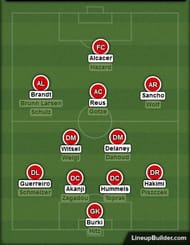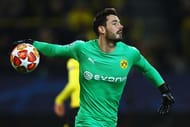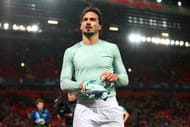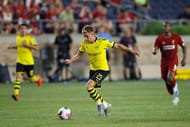Lucien Favre has injected new life into this Borussia Dortmund that is able to defend well as well as score more goals. After the below-par performances under Peter Bosz and Peter Stoger, this comes as a great refresher for the fans in the Yellow Wall.
Favre inherited a young team, led ably by a veteran of the club who's Dortmund through and through, Marco Reus. The youngsters around him have breathed life into the attack at the Westfalenstadion (formally known as Signal Iduna Park), and Reus seems like he's reverted to the superb talent who ran riot under the tutelage of Jurgen Klopp.
Having previously managed in the Bundesliga, the Swiss manager had a stint at Nice in France which saw them become a solid side capable of scoring a lot of goals and playing dynamic football. On his return to the Bundesliga, Favre was reunited with Reus who cut his footballing teeth under the former Borussia Monchengladbach manager in 2011 before moving to Dortmund.
Sure, it's quite a story, but does the chemistry translate onto the pitch? Fortunately for Dortmund, it does.

The system Favre employs is a basic 4-2-3-1 which often switches to a 4-1-4-1, maintaining a solid shape and denying the opposition any space in dangerous areas. He fills this team with young and energetic players capable, who Favre is famed for honing, and they're able to execute his disciplined, High energy style that requires them to press in certain midfield areas and break quickly once they have the ball.
Although players will largely be played in similar roles to what's depicted in the graphic, Favre is adept at identifying positive characteristics in his player and using them in a position that makes the best of those talents.
Goalkeeper

We're a week away from the start of the Bundesliga and their primary goalkeeper Roman Burki was ruled out with a minor injury for the DFL Supercup game against Bayern Munich prompting worries that he may miss the start of the season. Despite the stories, Burki will most likely start in goal.
Hitz has been an able deputy, showing no signs of nerves at the highest level. Although, it would be surprising to see him replace Burki this season.
Defenders

Many didn't see Abdou Diallo's transfer to PSG coming, but Dortmund seem to be in a good place as far as defence is concerned. They could benefit from some experience, though, and that's where the also unexpected arrival of Mats Hummels may be their strength.
After having to play Julian Weigl in the centre of his defence due to many circumstances last season, Favre will be happy to start Hummels and Akanji at the heart of his backline. In Toprak and Zagadou, he will have different options in case he feels like he needs to shuffle his centre-back pairing. Given Weigl's stellar performances in that position, Favre may be inclined to consider playing him there as well.
Achraf Hakimi will be the most likely starter on the right, though Lukas Piszczek will also get plenty of game time. Guerreiro on the other side will play a more conservative role than he did last season, at times filling in on the wing when Favre needed him to play further up the pitch. With the arrival of Thorgan Hazard and Julian Brandt, it's unlikely that Guerreiro will be needed to play the role in 2019/20.
Midfielders

The anchor of this midfield and a critical cog of the way Dortmund play, is Axel Witsel. His ability to contribute defensively, as well as begin threatening attacks with well picked out passes has been a big part of the reason that Dortmund were imperious for so many games in 2018/19.
He can play alone at the base of the midfield as he does in the 4-1-4-1 setup, but also does well in a double pivot, usually with Thomas Delaney. Weigl or Dahoud could also be options to partner him there. Although Weigl may be a good replacement when Witsel isn't available, his attacking play leaves a little bit to be desired.
This is where things start to get exciting for Dortmund. The trio that play behind the striker are extremely pliable in terms of their ability to play across the three positions. The crux of this attack is Marco Reus who usually starts behind the striker, if not in the striker position itself. Gotze would also be a capable number 10 in this team, but Reus is the beating heart of the side.
Last season saw, Pulisic, Guerreiro, and Bruun Larsen share responsibilities on the left flank, but the arrival of Julian Brandt may see him take up a regular spot in this space, with Bruun Larsen playing back-up to him. As he did with Guerreiro last season, Favre may favour Nico Schulz to play on the left wing in big games.
The right flank is a pretty straightforward choice. England's Jadon Sancho has been setting the Bundesliga alight with his skill and trickery, often paired with the desired end product as well. Marius Wolf is also a possible option in this position, but having led the assists charts last season in Germany, Favre will want him on the pitch at every possible opportunity.
Forward

Sure, Paco Alcacer was among Dortmund's top three scorers last season and will start a number of games this season, but his penchant for coming off the bench and scoring in the second half may be the best weapon in Dortmund's arsenal.
Dortmund are a team that come alive in the latter halves of games when the opposition is tiring. Bringing on Paco Alcacer routinely during this phase has worked wonders for Lucien Favre. To employ that tactic, we may see him use Thorgan Hazard as a striker.
The younger Hazard is no slouch in front of goal himself, he has scored over 10 goals in all of the last three seasons at Borussia Monchengladbach playing as a winger. If Favre indeed intends to play him upfront, it'll be interesting to see how he combines with the linkes of Brandt, Reus, and Sancho to build up his goal tally.
